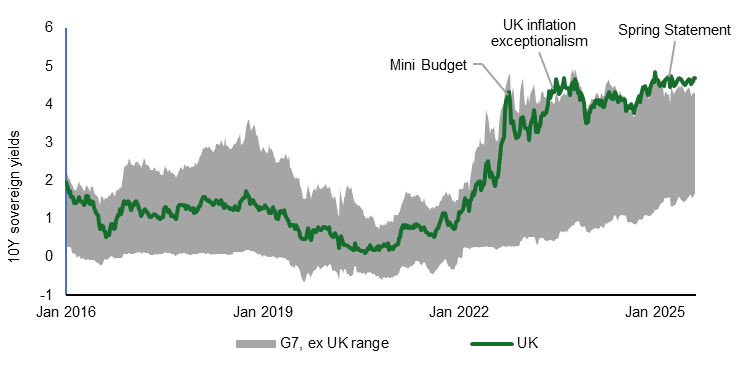
File image of Torsten Bell, picture by Kirsty O'Connor / Treasury.
News that Torsten Bell is writing the November budget is unsettling for markets.
Long-term UK gilts are yielding the highest interest rates in the developed world, meaning they offer handsome returns to international bond investors.
This should be attracting significant inflows of capital into the UK and boosting the Pound in the process.
Yet, the Pound to Euro exchange rate languishes below 1.16 and the Pound to Dollar exchange rate has entered another short-term trend of depreciation, suggesting something is bothering the currency.
This speaks of UK-specific underperformance and a fear about the trajectory of the UK economy and finances.
The worry is most evident in longer-dated gilt yields, where the UK's borrowing costs are now persistently higher than those of the G7.
As the chart shows, this has not always been the case, as the gilts tend to yield in the middle of the stream. That changed when Liz Truss tried to pass her mini budget, and a brief market panic ensued and caused UK bond yields to spike relative to elsewhere.
However, we are long past Truss, and the chart shows that risk-linked premium in gilts has actually grown.
Image courtesy of Simon French @ Panmure Liberum.
"One of the answers the reshuffled team will have to address is why the cleanest definition of a UK "moron premium" on Gilt yields has (most durably) emerged since the Spring Statement (also flickered in Mini Budget, and mid-2023)," says Simon French, economist at Panmure Liberum.
French's comments follow the reshuffling of Chancellor Rachel Reeves' team at the Treasury ahead of the November budget.
"Stubborn inflation and a hawkish BoE could be cited, but all qualitative data (see last week's PMIs) suggest that hawkishness is a function of fiscal/regulatory choices since the General Election. Bond market pricing suggests UK fiscal policy is drifting without an anchor," says the analyst.
Given Pound Sterling is closely allied to the bond market, this premium must also apply: the Pound usually tracks gilt yields higher, meaning it should trend higher in a low volatility environment where high interest rates are seen as attractive.
"GBP is among the highest yielders in the developed world," says a note from the UBS CIO office out last Friday.
At the start of the year analyst forecasts had the Pound-Euro trading just above 1.20 by this stage in the year. But consensus forecasts were slashed mid-year and instead the currency is seen at risk of further losses, this is despite elevated yields.
So what is behind the idiosyncratic headache?
French explains that stubborn inflation is a significant problem that has been created by polical decisions made by the new government. Generous pay rises and lifting of the minimum wage are driving above-inflation pay increases.
Policy actions such as raising employer National Insurance have served to anchor inflation higher as businesses pass on costs. They subdue growth, raising the spectre of stagflation; and stagflation is never supportive of a currency.
Government data released Monday meanwhile showed a record 6.5m are now on out-of-work benefits. In Birmingham, it's 25% of the working-age population. In Liverpool: 23%. Glasgow: 22%.

Bell, centre, and Rachel Reeves. Picture by Kirsty O'Connor / Treasury.
The November budget will require big tax rises to fund the spending, which should make businesses and households nervous and suppress economic growth further.
News that Torsten Bell will lead the creation of the November budget at the Treasury all but confirms the UK's trajectory.
Bell's appointment set tongues wagging in financial circles, as he is a big-tax, big-spend ideologue from the Resolution Foundation.
An audit of previous Bell proposals has been conducted by Guido Fawkes, giving an idea of some of the hikes Bell will attempt to bring in:
- Cap tax-free ISAs at £100,000.
- Make everyone pay inheritance tax by scrapping the nil-rate band. His alternative proposal was to continue the freeze on the nil-rate threshold…
- Significantly raise council tax for band E, F, G, and H properties in line with the SNP's 2017 hike.
- Remove primary residence relief and tax CGT on primary residence sales at a flat rate of 28%.
- Scrap the Lifetime ISA altogether.
- Devolve income tax-raising powers to local authorities. A massive hike…
- Raise Capital Gains Tax on shares to 37% and real estate to 53%,
- Charge Capital Gains Tax on death and when moving out of UK.
- Slashing VAT registration threshold to £30,000.
- Scrap business and agricultural property reliefs.
- Hike the basic rate of dividend tax from 8.75% to 20%.
- Hike income tax by 1p.
- Hike taxes on second homes.
- Charge national insurance on rental income.
- Hike national insurance for higher self-employed incomes by 300% to 8%.
- Cut the £270,000 cap on tax-free pensions to £40,000.
- Introduce pay-per-mile road duty for electric vehicles.
- Scrap the 5p cut in fuel duty. Increase fuel duty by 2% every year.
- Hike vehicle excise duty for heavier cars.
- Scrap Entrepreneurs' Relief.
If the government's policy choices since last year's budget are responsible for the market's caution towards UK assets, this leftist wish-list will do little to instil confidence.
Heading into November, it is little wonder then that international investors are demanding a premium to hold UK assets, including the Pound.
"The pound still hasn't got decent wings," says Kit Juckes, FX analyst at Société Générale. "Higher taxes are coming and so is slower growth and further GBP weakness."

